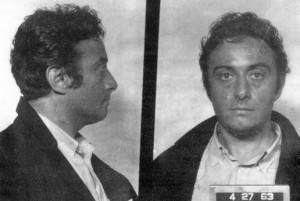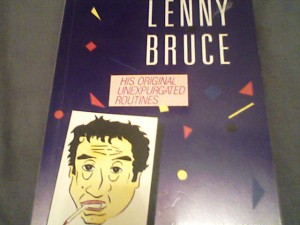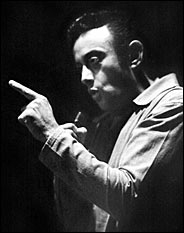
Booked in San Francisco for obscenity. Lenny Bruce was born Leonard Schneider in 1925 on Long Island.
I watched the first episode of Hugh Hefner’s swinging variety show Playboy After Dark from 1959 not too long ago, and it featured a great appearance by Lenny Bruce. Most of the scant film footage of the disgracefully honest comedian doesn’t do him justice, showing him when he was a shell of himself, as heroin and legal troubles took their toll. It’s amazing how much other comics took from Bruce: everything from George Carlin’s obsession with the hypocrisy of words to Richard Lewis’s finger snapping as he delivers his punchlines. At one point, Bruce tells Hefner that “tragedy plus time equals comedy,” a line that is often attributed to either Woody Allen or Carol Burnett. My guess is it’s not Bruce’s line, either, but I bet he’s the one who introduced it to other comedians.
 A few years back, I gleaned a copy of The Essential Lenny Bruce, a 1987 paperback compilation of his greatest bits and other fun stuff for Bruceophiles. Some of the material is very dated, but a lot of it reminds why a nightclub comedian was able to scare the hell out of authority figures in the ’50s and ’60s. One brief chapter, entitled “Chronicle,” provides an outline of the final seven turbulent years of Lenny’s life. An excerpt:
A few years back, I gleaned a copy of The Essential Lenny Bruce, a 1987 paperback compilation of his greatest bits and other fun stuff for Bruceophiles. Some of the material is very dated, but a lot of it reminds why a nightclub comedian was able to scare the hell out of authority figures in the ’50s and ’60s. One brief chapter, entitled “Chronicle,” provides an outline of the final seven turbulent years of Lenny’s life. An excerpt:
May, 1959, The New York Times:
“The newest and in some ways the most scarifyingly funny proponent of significance…to be found in a nightclub these days is Lenny Bruce, a sort of abstract-expressionist stand-up comedian paid $1750 a week to vent his outrage on the clientele.”
June 1960, The Reporter:
“The question is how far Bruce will go in further exposing his most enthusiastic audiences…to themselves. He has only begun to operate.”
September 29, 1961:
Busted for possession of narcotics, Philadelphia.
October 4, 1961:
Busted for obscenity, Jazz Workshop, San Francisco.
September, 1962:
Banned in Australia.
Busted for possession of narcotics, Los Angeles.
October 24, 1962:
Busted for obscenity, Troubadour Theatre, Hollywood.
December, 1962:
Busted for obscenity, Gate of Horn, Chicago.
January, 1963:
Busted for possession of narcotics, Los Angeles.
April, 1963:
Barred from entering London, England.
March, 1964, The New York Post:
“Bruce stands up against all limitations of the flesh and spirit, and someday they are going to crush him for it.”
April, 1964:
Busted for obscenity, Cafe Au Go-Go, New York City.
October, 1965:
Declared a legally bankrupt pauper, San Francisco.
November 1965, Esquire:
“I saw his act…in Chicago…He looked nervous and shaky…wretched and broken…You thought of Dorothy Parker, who, when she saw Scott Fitzgerald’s sudden and too-youthful corpse, murmured, ‘The poor son of a bitch.'”
August 3, 1966:
Dead, Los Angeles.

